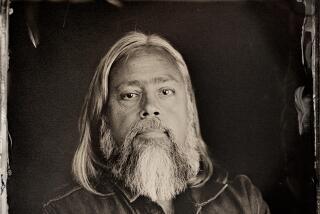Native American Storytellers Remember History From the Heart
- Share via
A FOREST OF TIME
American Indian Ways of History
By Peter Nabokov
Cambridge University Press
246 pages, $20 paperback
“I am very glad to demonstrate to you that we also have books,” said a Zuni storyteller quoted in Peter Nabokov’s “A Forest of Time,” “only they are not books with marks in them, but words in our hearts, which have been placed there by our ancients long ago, even so long as when the world was new and young, like unripe fruit.”
Nabokov, professor of American Indian studies and world arts and cultures at UCLA, surveys the diverse yet related ways in which the American Indians, who had no writing, preserved and passed on memories of their past and conceptions of their place in the world through their oral traditions.
“The Indian needs no writing,” explained an Ogalalla Sioux. “Words that are true sink deep into his heart where they remain. He never forgets them. On the other hand, if the white man loses his paper, he is helpless.”
Storytelling was everything. All Indians were aware of it; all heard their stories told and retold. Often tribes had special categories of members who, gifted with good memory, were charged with keeping their stories and passing them on. These oral traditions presented special difficulties for the settlers who came to North America and tried, some of them, to find out who the Indians were.
Two of the greatest 19th century American historians, William H. Prescott and Francis Parkman, disdained the Indians’ accounts of the contest for the continent, Nabokov writes. Prescott, he says, made the conscious choice “to suppress the nativist side of the story in his ‘Conquest of Mexico.’” Parkman, he reports, said that “Indian traditions are rarely of any value as historical evidence” as he was writing “France and England in North America.”
Since then white scholars of all sorts have tried harder to understand and limn the Indian ways of thought, perception and expression. In recent years they have been increasingly joined by Native American scholars.
Nabokov thoroughly and sympathetically surveys the results of these scholarly endeavors. He is an excellent guide to the diverse and changing trends in the various fields of anthropology as applied to American Indians. Unfortunately, for the general reader his approach is heavily academic and his format does not afford room for many of the haunting and moving Indian tales and ways of seeing the world that his book refers to.
Some, however, come through, such as: In the late 1960s a researcher talked, with an interpreter’s assistance, to an old Navajo man about the origins of the Indian people. The researcher showed him a map of Indians moving into North America across the land bridge where the Bering Strait is now and asked what he thought.
“He would like to tell you,” the interpreter said, “but he would be punished for it. If he told all his secrets like that, he would fall apart.” Then the interpreter said the old man believed that “maybe some other guys came over like that, but us Navajos came a different way”--maybe as cicada-like insects crawling up through the earth, maybe from white corn kernels, which are actually the mother of the Navajos.
Nabokov quotes the Navajo writer Luci Tapahonso as saying that while Navajo singers or chanters are entrusted with the sacred central narratives of the tribe, others in the tribe tell their own clan stories or tales of more recent times. “To Navajos,” Tapahonso said, “a person’s worth is determined by the stories and songs she or he knows, because it is by this knowledge that an individual is directly linked to the history of the entire group.”
It is easy to understand how such a concept baffled Prescott and Parkman, who were marvelous writers and magnificent historians, but who used the standard of European-American written history as their historical gold standard. Nabokov’s evenhanded survey is a useful guide to those who want to look further into American Indians’ strange and lovely habits of thought about their past.
More to Read
Sign up for our Book Club newsletter
Get the latest news, events and more from the Los Angeles Times Book Club, and help us get L.A. reading and talking.
You may occasionally receive promotional content from the Los Angeles Times.










